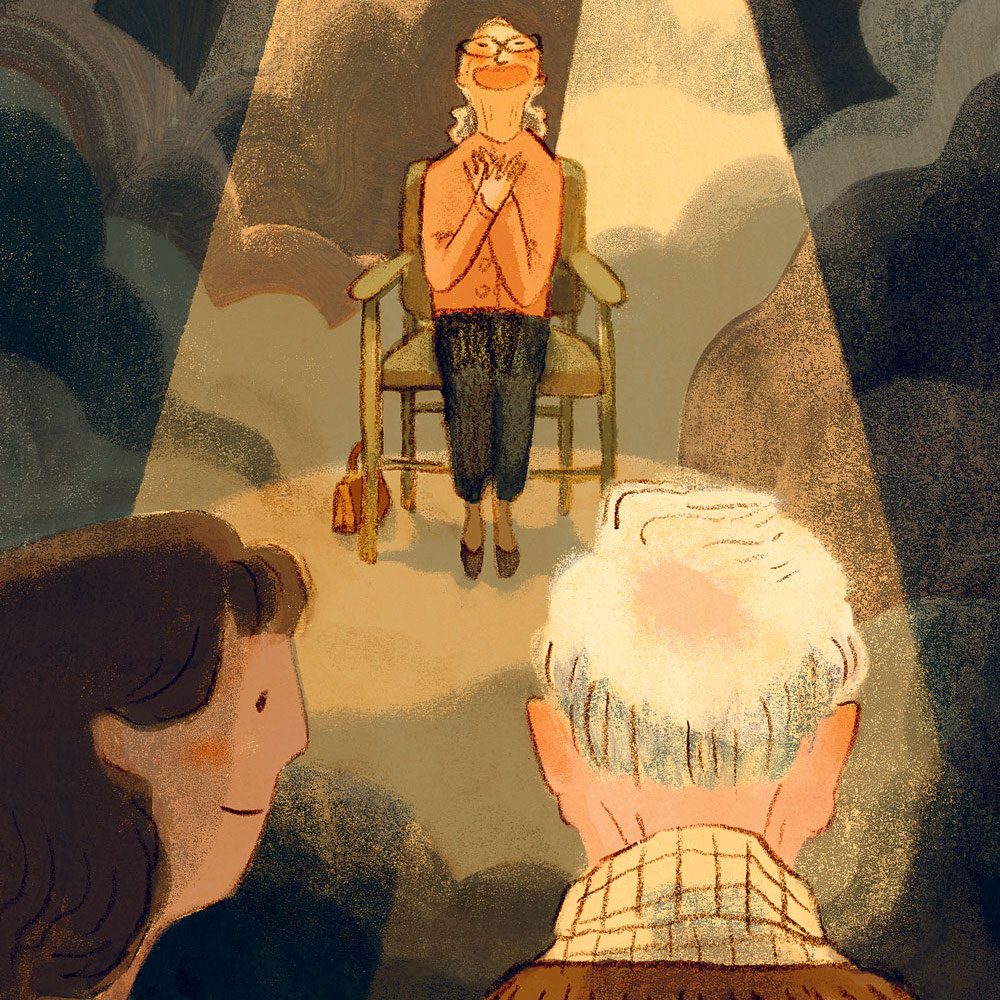How a Total Stranger Pulled My Dad Out of His Alzheimer’s Fog
One day, a woman began singing Celine Dion in the doctor's waiting room. I wasn't prepared for what happened next.

A few years ago, at a medical laboratory clinic in Waterloo, Ont., an elderly woman sat on the edge of a waiting room chair belting out the Celine Dion tune “My Heart Will Go On.” Other than a slight rhythmic rocking of her torso to the Titanic theme song, she was motionless, with her eyes shut and her arms crossed elegantly over her chest. With little effort, she was able to send her sweet, high-pitched voice exploding into every corner of the clinic.
I had fun watching how people reacted. There was a lot of shifting in seats and a couple of stony sideways stares, but mainly they awkwardly averted their eyes and tried to pretend that there was nothing out of the ordinary going on. Business as usual. This sort of thing happens all the time.
I was at the clinic with my father, who was getting a routine blood test, when the woman first arrived. She settled into the seat directly across from my dad. Because she was so tiny, she was forced to perch on the edge of the chair so her feet could touch the floor. The position made it seem as though she was sitting forward to engage in conversation with him. She smiled at him and he smiled back.
I was concerned about how my dad would react to the possible encroachment on his space. He was 77 years old at the time and had been living with Alzheimer’s for several years. He came into adulthood in the Swinging ’60s, but he was definitely a product of the ’50s. He was a brilliant, introverted, card-carrying Catholic military man who was suckled and plumped on guilt, obligation and humility. When he was healthy, he tolerated people’s eccentricities dutifully but with a healthy dose of silent reproach. Privacy and personal space were definitely his thing, and he considered it wholly bad mannered to bring undo attention to oneself. Since Alzheimer’s has a tendency to play havoc with a person’s patience and erode restraint, Dad had experienced a few challenging encounters in the past. I couldn’t help but think that this melodic little woman was playing with fire.
Opening Note
Her singing began gently, like a quiet hum. I glanced over at Dad to see his response. His smile was gone, and he was staring right at her. She was staring back. I couldn’t read his expression initially, but it seemed to be something like confusion. This wasn’t an unusual state for him, and I wondered if he was actually seeing her at all or if he was lost somewhere deep in his mind, not really aware of her presence at that point. Or maybe he was trying to establish whether this was someone he should know.
Dad had never been one to partake comfortably in unnecessary conversation. Traditionally, he would relinquish that task to my mother, who took over the responsibility with her own brand of enthusiastic relish while he sat contentedly on the outskirts as a silent but engaged participant. If we had been more astute, we probably would have recognized his declining condition earlier. We would have noticed that, on the odd occasions when he was drawn into a conversation, he’d become increasingly reliant on her to finish his thoughts or answer questions directed to him. Without missing a beat, she would fill in all the blanks whenever he paused, and our attention was shifted away from him.
It also took us some time to realize that he had begun to abandon any effort to nod politely or insert an obliging smile in appropriate places. We just thought he was getting a little cranky in his old age.
That’s what was happening now: no more smile, no amiable nod, no acknowledgment of any kind. Just a stare. This didn’t deter the diminutive songstress one bit, and her singing slowly got louder. By the time she got to the chorus, “Near, far, wherever you are…” it was full-tilt belting. She was in a meditative, eyes-shut, torso-rocking, inner-diva-embracing trance.
Now Dad looked a little stunned.
I tried not to laugh. It wasn’t that I didn’t appreciate this woman. In fact, I kind of loved her. I wanted to be her friend. But the thought of my tightly wound, somewhat prudish dad being serenaded in a packed medical lab by this itty-bitty Celine Dion was just too delicious. Still, I watched cautiously, waiting for any sign of an impending irritated outburst and was considering my options on how best to intervene.
Instead, he was starting to look entertained. His face softened, and the tension eased in his brow. He no longer looked confused.
Encore
People will tell you that Alzheimer’s is a thief, that it steals your loved ones, slowly, day by day. There is, without a doubt, so much heartbreaking truth in that statement. The loss is painful and unrelenting. But during certain experiences with my dad, things have happened that allowed me to see a side of him that I never knew existed. I will hold onto those quiet moments when, unsolicited and for the first time ever, he held my gaze and told me tender stories about when he was a child or regaled me with tales of his time in the air force, as if he knew that he didn’t have much time left to show me who he really was. In a quiet and unexpected way, that’s also what happened for me that day in the clinic. Alzheimer’s sometimes seemed to be peeling back the onion of my dad’s true self, and while I hate that he struggled with this disease, I love the sweet man I’ve met.
When her song ended and the waiting room became silent, the woman opened her eyes. My dad was still looking directly at her.
“That was beautiful,” he said.
And she smiled and said, “Thank you.”
© 2019, Deborah Stock. From “The Odd Encounter that Pulled Dad Out of his Alzheimer’s Fog,” The Globe and Mail (October 22, 2019), theglobeandmail.com
Next, find out 12 myths about Alzheimer’s you need to stop believing.






